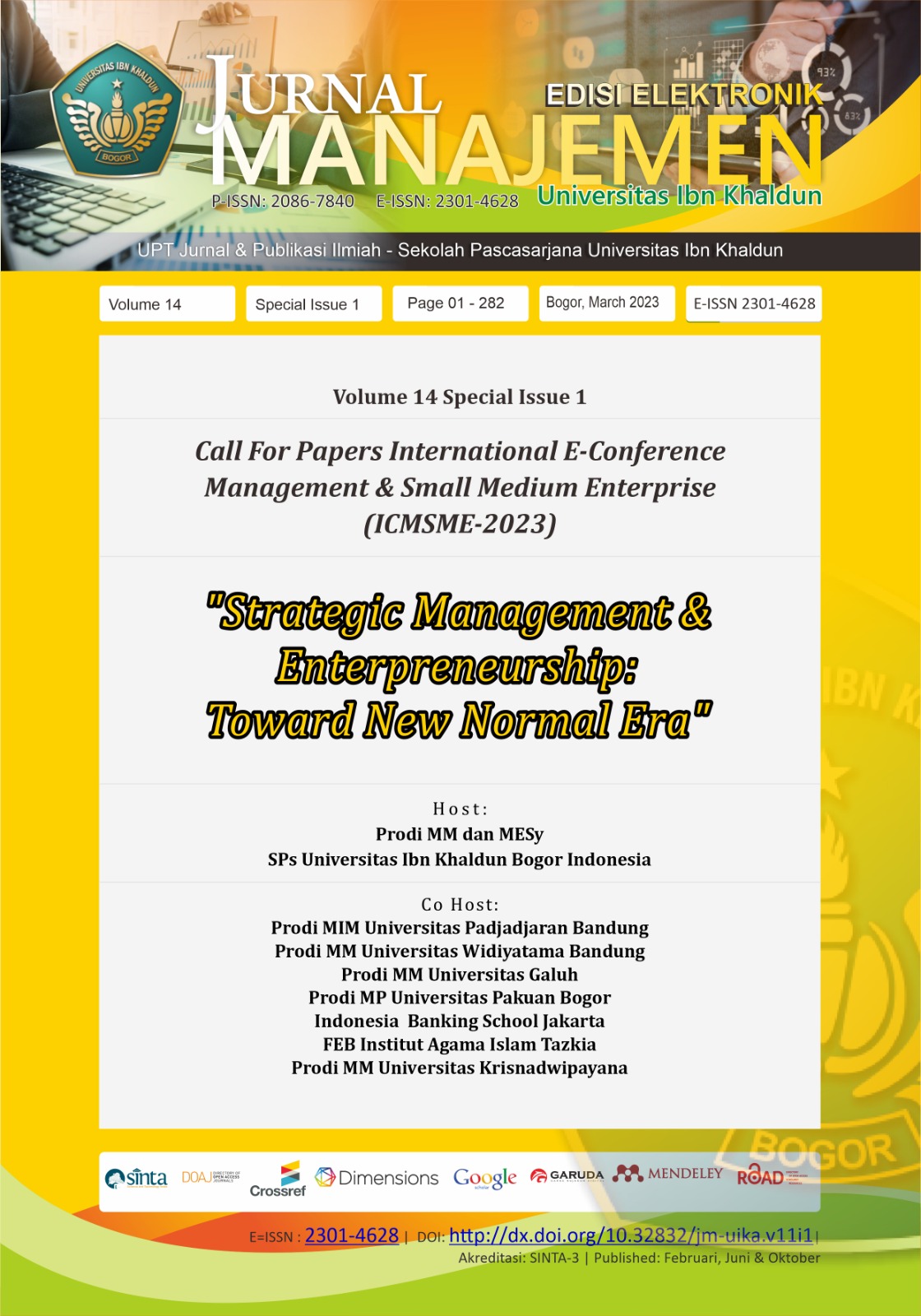Non-Usury Business Model in Islamic Banking Practice (Waqf, Profit and Loss Sharing, Zakat)
DOI:
https://doi.org/10.32832/jm-uika.v14i1.9785Keywords:
Islamic Banking, Waqf, Profit and Loss SharingAbstract
One of the concepts that can be offered to solve the problem of the global economic crisis is the Islamic economic system, the application of which is integrated into the existing economic system. The Islamic Finance Institution in Indonesia has a great opportunity to be developed. Profit and Loss Sharing (PLS) can be used as an alternative solution to replace the interest system. The purpose of this study is to discuss the islamic banking practice model with capital from waqf, with PLS operational system, and followed with charity zakat activities. The writing methodology applied in this study is a descriptive method with a qualitative approach. The concept of the Islamic Bank model is found whose capital comes from productive waqf funds, so that the system can be full non-usury and its activities can be full ratio for profit and loss sharing (PLS). Savings are organized without interest (0%) and deposits with a profit-sharing ratio. Bank operations are taken from a small percentage of bank capital as a waqf fund manager. The bank's profits from business revenue sharing are partly regulated as zakat and the other part is for business development and situational reserves. It is necessary to think of Islamic economic experts to realize enabling conditions, in the form of supporting regulations, increasing the competence and professionalism of the nazir, as well as sufficient education/literacy. This paper can be a bridge to review Islamic banking practices in the future.
References
Adam, Muhammad. (2020). Paradigma Keuangan Islam Dalam Menghadapi Krisis. Al-Mashrafiyah: Jurnal Ekonomi, Keuangan dan Perbankan Syariah ISSN (p): 2597-4904 ISSN (e): 2620-566, Volume 4, Nomor 1, April (2020), h. 46-57 https://doi.org/10.24252 /almashrafiyah.v4i1.12918
Antonio, M.S. (2001). Bank Syari'ah: Dari Teori ke Praktik. Jakarta: Gema Insani Press.
Ascarya. (2007). Akad dan Produk Bank Syariah. Jakarta: Raja Grafindo Persada.
Asmawati & Hamzah. Progresif Sumber Keuangan Islam di Era Klasikdan Modern. Al-BayyinaH : Jurnal of Islamic Law / Jurnal Hukum Islam, ISSN: 1979-7486 (p); 2580-5088(e) Vol. 3 No. 2. p. 204-219.
Assegaf, M. (2019). Pelaksanaan Wakaf Produktif di Bank Wakaf Mikro Syariah Denanyar Jombang. MAZAWA: Manajement of Zakah and Waqf Volume 1, Nomor 1 Desember 2019.
Badruzaman, D. (2019). Riba Dalam Perspektif
Keuangan Islam. Al Amwal: Vol. 1, No. 2, Februari 2019.
Balqis, W.G. & Sartono, T. (2019). Bank Wakaf Mikro Sebagai Sarana Pemberdayaan pada Usaha Mikro, Kecil dan Menengah. Jurisdictie: Jurnal Hukum dan Syariah Vol. 10 No.2 Tahun 2019. DOI: 10.18860/j.v10I2.7380 215
Hafidhuddin, D. (2021). Membangun Kemandirian Umat. Bogor: UIKA Press.
Hutagaol Y., dkk. (2022). Strategi Penguatan Keuangan Negara Dalam Menghadapi Ancaman Resesi Global 2023 Melalui Green Economy. Jurnal Pajak dan Keuangan Negara Vol.4, No.1S, (2022), Hal.378-385
Masyhuri. et al. (2005). Teori Ekonomi dalam Islam. Yogyakarta: Kreasi Wacana.
Muhammmad, A. (2008). Tafsir Ibnu Katsir. Bogor: Pustaka Imam Asy-Suafi'i.
Shihab, M.Q. (2021). Ekonomi Bisnis dan Bunga Bank. Tangerang Selatan: Lentera Hati.
Sulaiman, S. (2015). Prinsip-prinsip Keuangan Islam Menurut Abdullah Saeed. Millah Vol. XV, No.1, Agustus 2015.
Tanjung, Hendri. (2014). Kritik Ekonomi Konvensional dan Solusi Ekonomi Islam. Hunafa: Jurnal Studia Islamika. Vol. 11, No. 2, Desember 2014: 277-292
Tanjung, Hendri. (2018). An Integration Of Waqf And Ventura Capital: A Proposed Model For Indonesia. Journal of Islamic Monetary Economics and Finance, Volume 3, Special Issue (2018), pp 125 - 140 p-ISSN: 2460-6146, e-ISSN; 2460-6618.
Tarmizi, E. (2020). Harta Haram Muamalat Kontemporer. Bogor: Berkat Mulia Insani.
Downloads
Published
How to Cite
Issue
Section
License
Authors who publish with this journal agree to the following terms:
- Authors retain copyright and grant the journal right of first publication with the work simultaneously licensed under a Creative Commons Attribution-NonCommercial-ShareAlike 4.0 International License that allows others to share the work with an acknowledgement of the work's authorship and initial publication in this journal.
- Authors can enter into separate, additional contractual arrangements for the non-exclusive distribution of the journal's published version of the work (e.g., post it to an institutional repository or publish it in a book), with an acknowledgement of its initial publication in this journal.
- Authors are permitted and encouraged to post their work online (e.g., in institutional repositories or on their website) prior to and during the submission process, as it can lead to productive exchanges, as well as earlier and greater citation of published work (See The Effect of Open Access).











